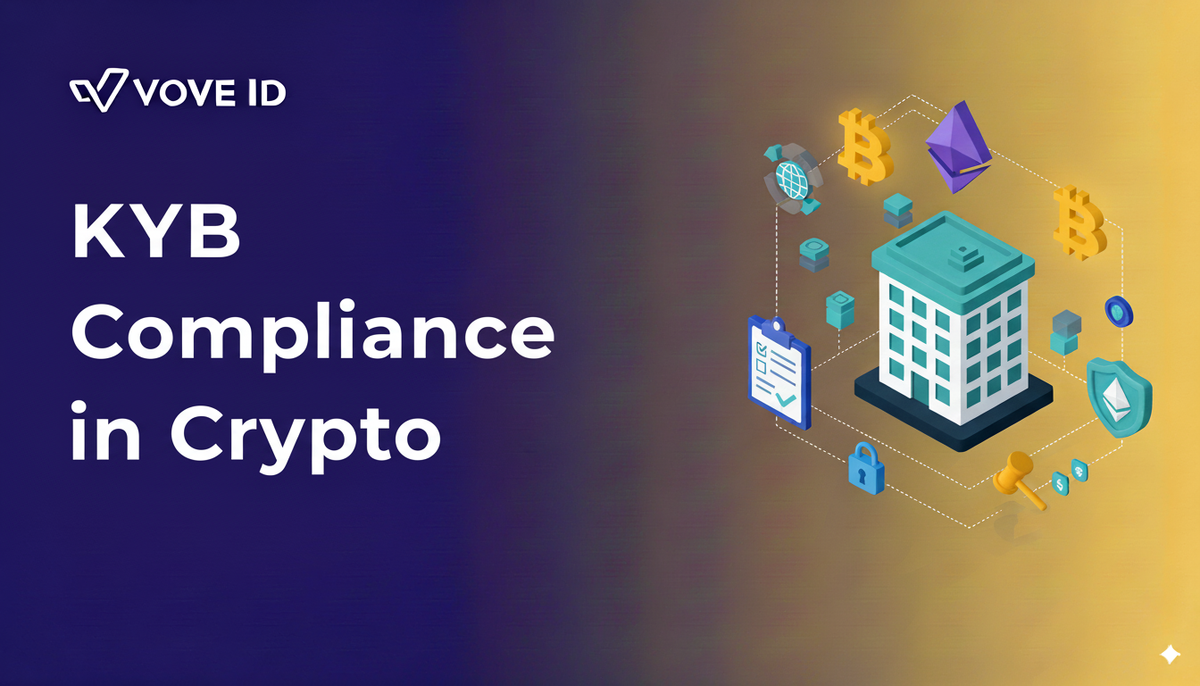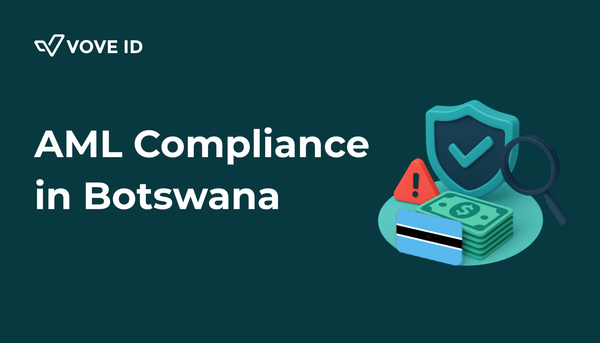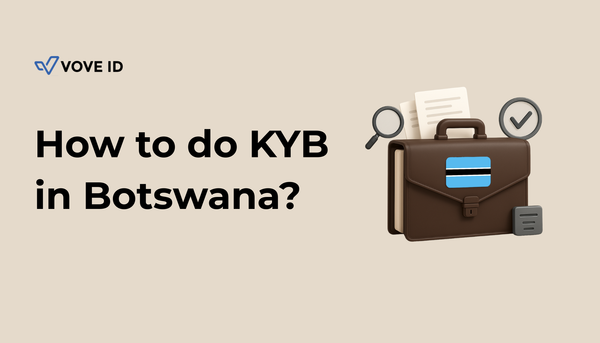KYB Compliance in Crypto: A 2025 Guide for Exchanges and Wallets
Learn how crypto exchanges and wallets in Africa and MENA can achieve full KYB compliance in 2025 with AI-powered solutions from VOVE ID.

In 2025, the crypto ecosystem has evolved from peer-to-peer trading to complex institutional networks. Compliance now extends beyond individuals: Know Your Business (KYB) is as critical as Know Your Customer (KYC) for exchanges, custodians, wallets, and OTC desks engaging with corporate clients, liquidity providers, and institutional investors. In 2024, industry reports suggest nearly 30% of crypto exchanges faced penalties for weak business verification, underscoring KYB’s urgency. Tools like VOVE ID’s KYB solutions empower crypto platforms to efficiently verify corporate clients while maintaining compliance, helping startups and exchanges navigate regulatory requirements in Africa and the MENA region.
Global and Regional KYB Regulatory Landscape
FATF Guidelines
The Financial Action Task Force (FATF) Recommendation 15 requires Virtual Asset Service Providers (VASPs) to verify corporate counterparties, including ultimate beneficial owners (UBOs), to prevent shell companies, sanctions evasion, and money laundering. This global standard sets the tone for regional regulations.
European Union (EU)
The Markets in Crypto-Assets (MiCA) regulation, fully enforced in 2025, mandates KYB for exchanges and custodians under Article 63, requiring verification of corporate structures, UBOs, and sanctions exposure. AMLD6 complements MiCA by lowering UBO identification thresholds to 25% ownership and enforcing cross-border data sharing. Non-compliance risks fines up to €5M or license revocation.
Africa
- Nigeria: The SEC mandates KYB for corporate clients. The CAC is digitizing records, but enforcement is hampered by inconsistent registry access.
- South Africa: The FSCA classifies crypto assets as financial products under the Financial Intelligence Centre Act, making KYB mandatory for licensed platforms.
- Kenya: Draft VASP regulations, expected to finalize in 2025, include KYB, leveraging the eCitizen platform for corporate data, though manual processes persist.
MENA
- UAE: Regulators like VARA (Dubai), ADGM (Abu Dhabi), and DIFC enforce stringent KYB for VASPs. Exchanges must verify UBOs and directors, with penalties up to AED 20M or license suspension for non-compliance.
- Bahrain: The Central Bank of Bahrain (CBB) mandates KYB for licensed exchanges under its Crypto-Assets Module, focusing on UBOs and risk assessments.
- Saudi Arabia: SAMA enforces KYB within its regulatory sandbox, with full obligations expected as crypto regulations mature.
These regulations reflect a global shift: platforms must know the businesses they engage with, not just individual users.
Why KYB Matters in Crypto
Robust KYB protects exchanges, wallets, and ecosystems from significant risks:
- Enabling fraud through unverified shell companies
- Violating sanctions, risking fines or license revocation
- Eroding trust with regulators and investors
- Exposing ecosystems to systemic risks from unvetted partners
For example, in 2023, an African exchange faced multimillion-dollar fines for onboarding a shell company linked to illicit transactions. Conversely, startups with robust KYB practices often secure faster licensing approvals in MENA, streamlining regulatory processes. In the UAE, a crypto custodian reported 15% faster partnership agreements after implementing KYB, demonstrating its business value.
Key Challenges of KYB in Crypto
- Opaque Business Structures: Limited corporate transparency in some jurisdictions complicates UBO identification, often requiring cross-jurisdictional searches. Automated tools can streamline this process.
- Fragmented Corporate Data: Despite digitization in Nigeria (CAC) and Kenya (eCitizen), many African and MENA registries remain manual. Integrated platforms bridge these gaps.
- Cross-Border Fraud Risks: Global liquidity flows expose platforms to shell companies in high-risk jurisdictions. Real-time sanctions and PEP screening mitigate these risks.
- Balancing Speed and Compliance: Thorough KYB checks can delay onboarding, hurting competitiveness. Automated verification ensures both speed and depth.
- High Compliance Costs: KYB processes strain lean startups’ budgets, especially in emerging markets. Scalable, cost-effective solutions are critical.
How VOVE ID Supports KYB
VOVE ID offers crypto platforms tools for digital identification and corporate verification:
- Automated Registry Access: Instantly validates corporate records from national databases.
- UBO and Director Screening: Checks against sanctions lists and PEPs (no transaction monitoring).
- Mobile-First Onboarding: Leverages Africa’s 80%+ mobile penetration for seamless verification.
- Data Privacy Compliance: Adheres to GDPR and local data laws.
- API and SDK Integration: Easy connection to existing platforms without building internal KYC/KYB solutions.
By using VOVE ID, crypto startups and exchanges can accelerate onboarding, reduce administrative burdens, and remain compliant with both global and regional regulations.
Future Trends in KYB for Crypto
- Decentralized Organizational Identity (OrgID): Blockchain-based identities could reduce KYB costs by 30% through instant verification.
- Blockchain-Based Registries: On-chain registries promise transparency but face regulatory skepticism.
- AI-Driven Continuous Monitoring: Real-time alerts for corporate compliance risks may replace periodic checks.
- DeFi Compliance Integration: As DeFi attracts institutional liquidity, platforms may adopt KYB to meet global standards.
These trends position KYB as a cornerstone of scalable, trusted crypto ecosystems.
❓ FAQ
Is KYB mandatory for crypto startups in Africa and MENA?
Yes, though enforcement varies, most regulators require or are phasing in KYB.
What is the difference between KYC and KYB in crypto?
KYC verifies individuals; KYB verifies businesses, including directors and UBOs.
What are the penalties for non-compliance with KYB?
Penalties include fines (e.g., €5M in the EU, AED 20M in the UAE), license suspension, or reputational damage.
How can startups streamline KYB without slowing growth?
Automated verification tools, like those offered by VOVE ID, allow efficient compliance and fast onboarding.
Conclusion
In 2025, KYB is non-negotiable for crypto exchanges and wallets in Lagos, Dubai, Nairobi, and beyond. Early adoption accelerates licensing, builds investor trust, and mitigates fraud and regulatory risks. By leveraging VOVE ID’s mobile-first KYB solutions, platforms can confidently navigate complex compliance requirements while maintaining speed and efficiency. Prioritizing KYB today ensures startups remain compliant, competitive, and ready to lead in the trusted crypto ecosystem of tomorrow.
Ready to simplify KYB compliance and accelerate growth for your crypto platform?
Start using VOVE ID today to automate corporate verification and onboard clients seamlessly.




